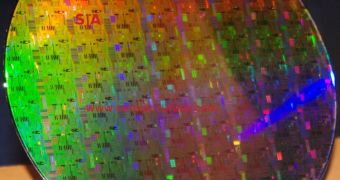Samsung's foundry operation has just announced that the company is getting ready to run 20nm test-chip shuttles for its customers beginning with the second half of this year, making it one of the first semiconductor manufacturers to use this new fabrication node.
According to the EETimes website, Samsung's 20nm process is based on a planar bulk CMOS process with "gate-last" high-K metal gate (HKMG) and will be manufacturable with 193nm immersion optical lithography on a limited minimum pitch.
"Our 20-nm technology will be a full node shrink from 28-nm, enabling the approximate 50 percent area scaling that the industry has come to expect with each technology generation," said Ana Hunter, vice president of Samsung's foundry services, in a post on the company's website.
In addition, Hunter also predicts that the new manufacturing node will provide a 30 percent improvement in performance over present day 28nm technology at the same standby current.
The chips built using the 20nm fabrication process will be used in various devices, including smartphones, tablets and other portable consumer electronics as well as in IT communications infrastructure equipment.
This announcement comes just one month after IBM, GlobalFoundries, and Samsung Electronics, all members of the Common Platform Initiative, have announced that starting with the 20nm node they will switch to gate-last technology.
Of the three, Samsung was most eager to switch to this manufacturing process as it enabled the company to shorten the time it needed to transition to the 20nm node.
The difference between the two technologies lies in the timing when the metal electrode is deposited, before or after the high temperature activation anneal(s) of the flow, gate-first, at least in theory, allowing customers to transition to a lower manufacturing node without having to redesign their chips.
Right now, Samsung is the world's second largest semiconductor manufacturer and is surpassed only by Intel.
However, the company has only recently entered the foundry market where it has to compete with TSMC, which controls about 50% of the industry, as well as with other smaller players.

 14 DAY TRIAL //
14 DAY TRIAL //